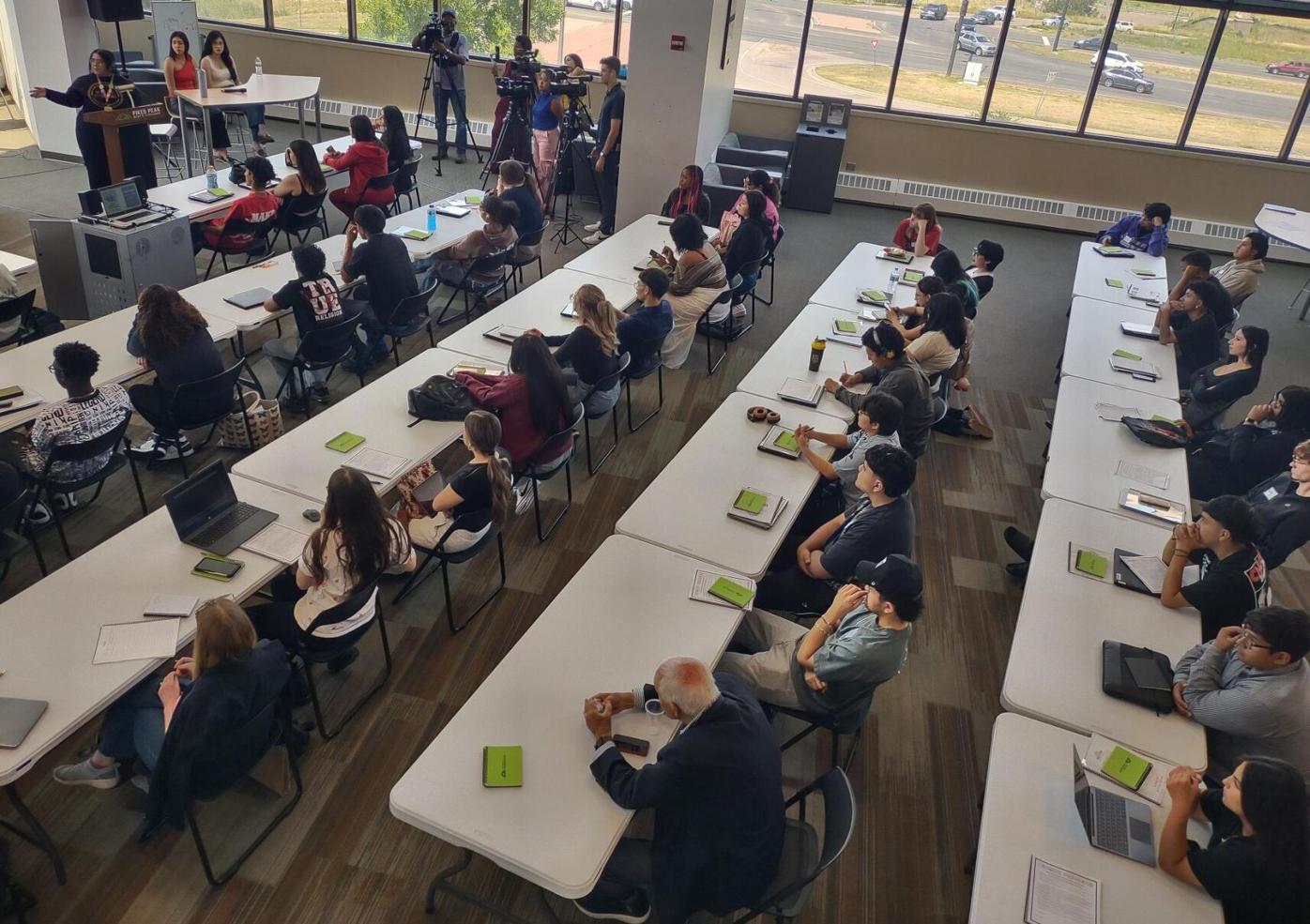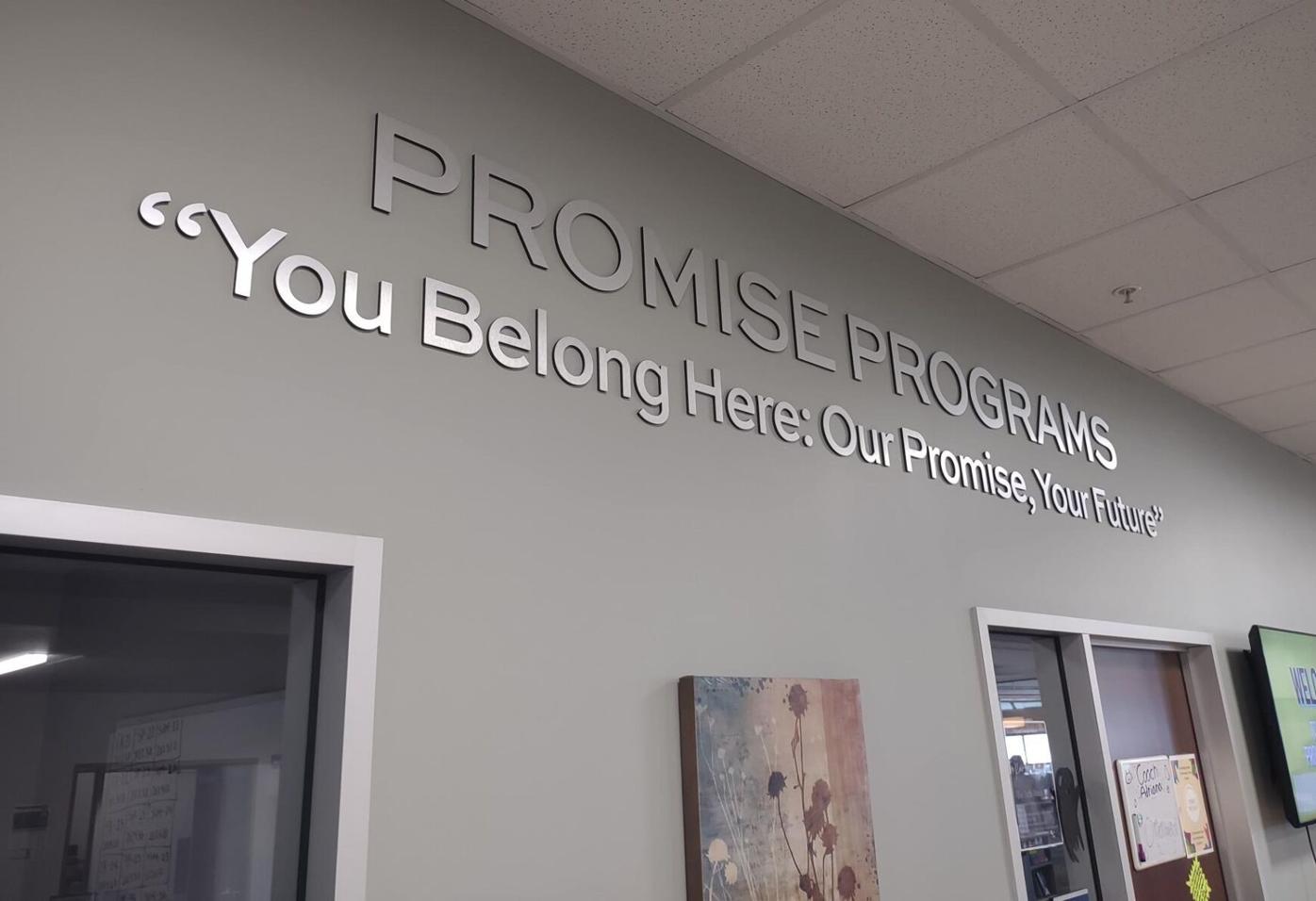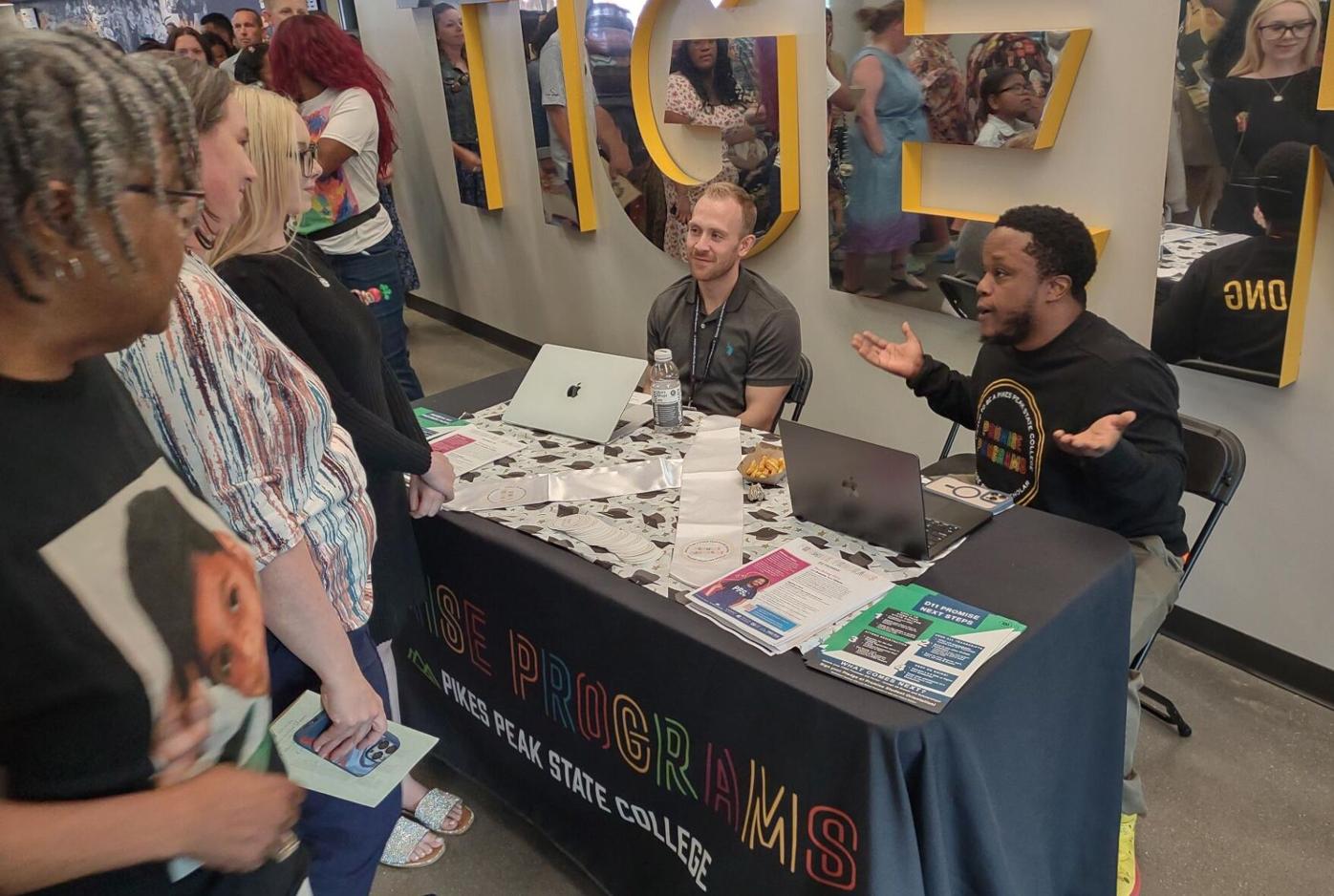Promise kept: D-2 taxpayers make scholarship program permanent for Harrison grads

Eric Young, The Gazette
When Pikes Peak State College welcomed its latest cohort of graduates from Harrison School District 2 last Wednesday, it also marked the beginning of a new era of higher education.
While the D-2 Promise Program has covered tuition costs for all graduates from the local school district since 2020 with funding from The Dakota Foundation and the Legacy Institute — two Colorado Springs-based nonprofits — it is now permanently funded through local tax dollars.
Thanks to the passage of a ballot measure last November, D-2 now annually contributes district funding to sustain the scholarship program.
Throughout the day, incoming students toured the campus while they participated in breakout sessions on academic assistance, additional resources and the requirements to fulfill the promise.

Promise Program resources offered at Pikes Peak State College include academic advising, faculty advising and holistic support.
Eric Young, The Gazette

Promise Program resources offered at Pikes Peak State College include academic advising, faculty advising and holistic support.
Eric Young, The Gazette

Promise Program resources offered at Pikes Peak State College include academic advising, faculty advising and holistic support.
Following their orientation, Pikes Peak State College President Lance Bolton addressed the new students and informed them that they were the first beneficiaries of the only publicly funded first-dollar scholarship program in the nation.
That distinction, he said, marked the first day of what started as “a dream.”
“It was a dream to put money in your pockets so you could focus on going to school and not just survive,” he told them. “It was a dream of breaking cycles of poverty in southeast Colorado Springs and it was a dream of hundreds and thousands of college graduates in our community that would change our community for the better.
“But most of all: We dreamed of you … we dreamed of giving you a real chance.”
Free college 'Promise' continues to grow, open doors for high school graduates
Eligible students must maintain a 67% completion rate and at least a 2.0 grade-point average while enrolling in at least 24 credits per semester and regularly meeting with Promise coaches and attending Promise workshops.
Along with covering their college costs, local Promise Programs also offer students professional coaching throughout their tenures in school to help students navigate the expectations of classes, financial literacy and school-work-life balance.
For students like Nyx West, who is beginning their second year at PPSC, the additional resources and coaching further helped them find their calling.
“He has been very helpful on planning what classes I can do and the timeframe of when I’m supposed to graduate with my three majors,” they said of their coach. “And they’re very open to letting you know that you need these types of credits or these types of classes at this point.”

Promise Program adviser Dre Guy explains the scholarship and what it offers to local families following Palmer High School’s graduation ceremony on May 21.
Eric Young, The Gazette

Promise Program adviser Dre Guy explains the scholarship and what it offers to local families following Palmer High School’s graduation ceremony on May 21.
Entering their second year at PPSC, Nyx is working toward communications, studio art and art history degrees before matriculating to the University of Colorado Colorado Springs.
Investing in students
While Promise programs are in place throughout the country across various organizations, the free scholarship initiative in Colorado Springs dates back to when Bolton and Dakota Foundation founder Bart Holaday recognized declining achievement and rising inequalities in primary education.
“Lance and I talked about this problem for at least 10 years,” Holaday said. “And community colleges, by virtue of having a program that is efficient and inexpensive, can help people who come from poverty get an opportunity to move up the social ladder. And that’s so important to me.”
The program began as an alternative for students who didn’t apply for Pell Grants, but more work was needed to convince every student that they’re college material and not to focus on costs. Additional resources were developed at PPSC shortly after to help guide students through the application processes.

Promise Program resources offered at Pikes Peak State College include academic advising, faculty advising and holistic support.
Since first rolling out the D-2 Project in 2020, PPSC has continually worked to expand access to graduates. The school now accepts qualifying graduates from all Colorado Springs D-11 high schools, and for members of all federally recognized American Indian tribes living in El Paso, Teller or Elbert counties.
Pikes Peak State College announces new Native American scholarship: 'action is meaningful'
In D-2, starting with the Class of 2024, both PPSC and Colorado State University Pueblo began granting direct admission to all of its graduates to smooth out the process for those unfamiliar with the application process.
Last November, voters in D-2 approved Ballot Measure 4A, a mill levy override that adds an annual $9 million to the district’s budget. Along with sustaining the scholarships for all of its graduates, the new funding also contributes to teacher salaries and charter school upgrades.
With the program now publicly funded, Holaday said it has grown bigger than he ever imagined.
“What an endorsement,” he said of the local taxpayers’ support. “They’re saying that we need to invest in the education of our students and our people. It’s wonderful.”
According to PPSC data, since the Promise programs launched in 2020, more than 877 scholars have been served, with 68% experiencing positive academic outcomes like continued enrollment, transfer or graduation. Retention rates have climbed from 47% in the first year to 74% currently, with students earning more than 210 credentials in high-demand fields.
2025 graduate Alani Rivera admitted that her family “ain’t the richest” and said she saw the program as her way to access postsecondary education, upon learning about it while attending James Irwin High School.
“It’s like I had an in, to be able to get into college,” she said. “Like, this was my way in to where I didn’t have to worry about finances or anything like that anymore.”
Fellow James Irwin grad Cassidy Maley agreed and said she had no idea what lay in store for her after high school. Now pursuing a psychology degree, she said the Promise program was her “main motivation” to finish high school after learning about it in middle school.
New schools, raises, sales tax among Pikes Peak region public education votes
“Just having that opportunity for us, you’ve got to take it. And if you don’t, it’s your decision, but for people like us who can’t afford to go to a fancy school or move out of state, it’s just such a big opportunity.”
The day of orientation concluded with a ceremonial signing where each student pledged their commitment to the program’s requirements and their own individual goals.
For Rivera and Maley, both first-generation college students, the fact that they made it there has already created excitement and pride for them and their families.
“It’s like an award for us, being the first,” Maley said.










